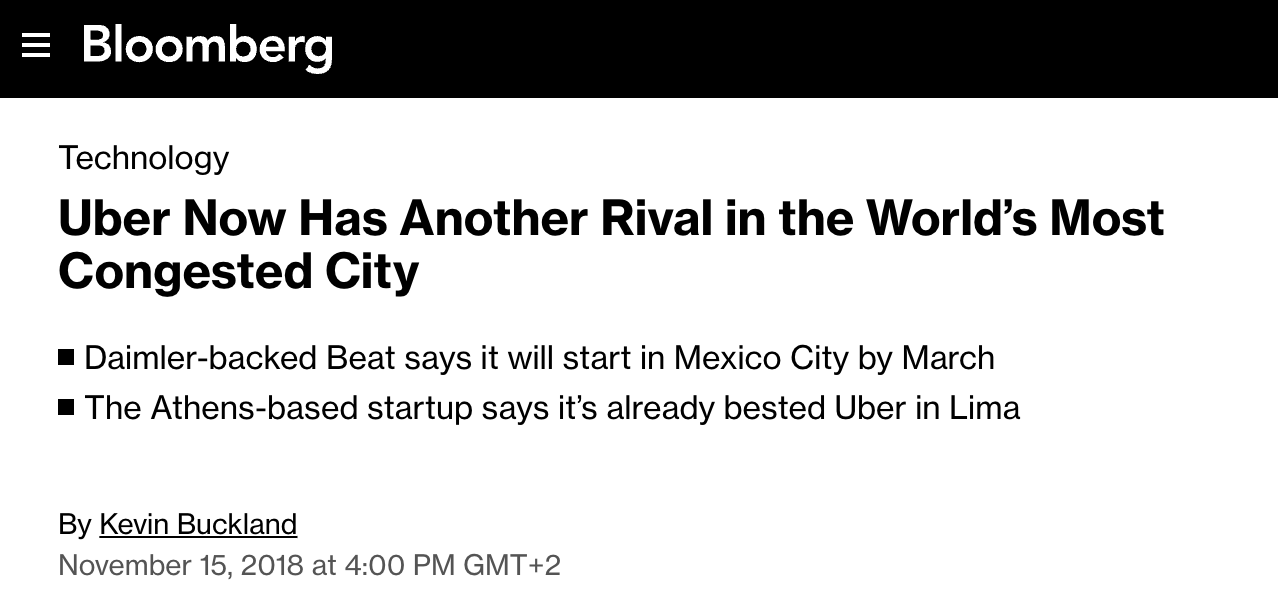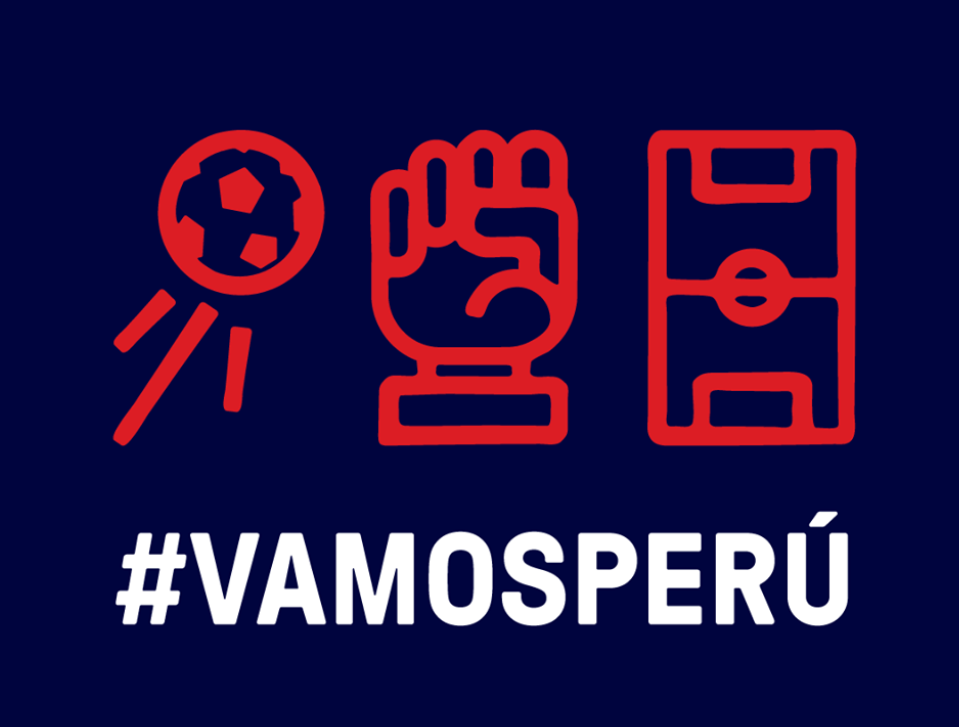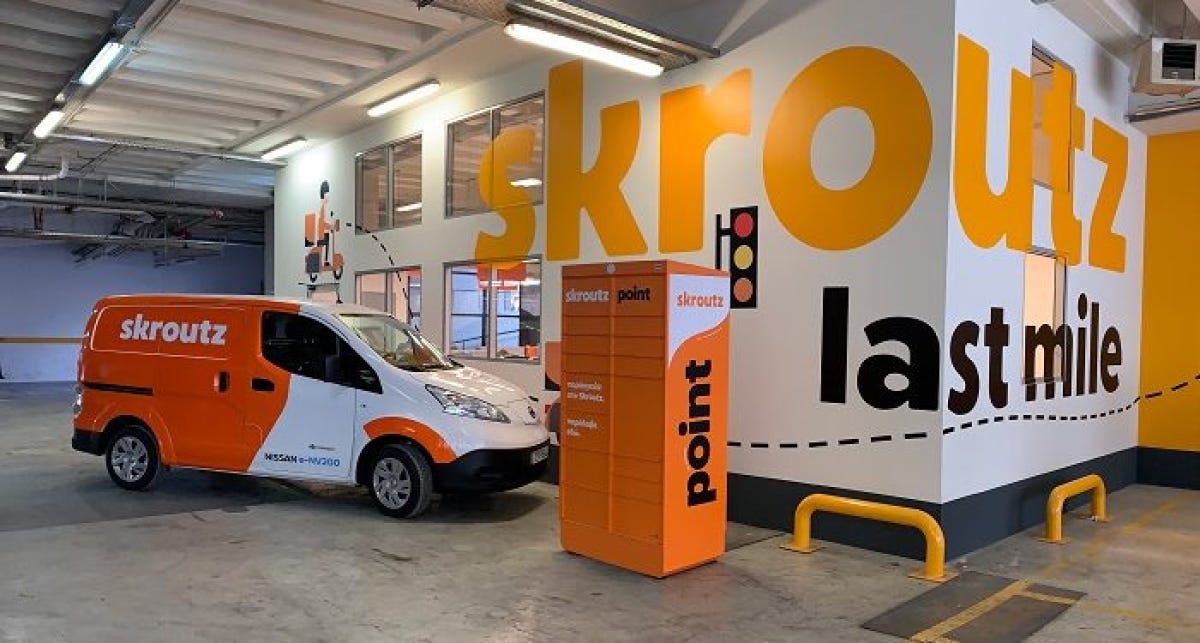Scaling Consumer Marketplaces
The CMO behind Skroutz and Beat
This is Startup Pirate #120, a newsletter about technology, entrepreneurship, and startups every two weeks. Made in Greece. Here’s what we recently explored:
If you’re not a subscriber, hit the button below and come aboard:
Scaling Consumer Marketplaces
Thalia Geladaki is the marketing mastermind behind two of the most successful consumer marketplaces (and brands in general) that started from this corner of the world: Beat (ride-hailing app acquired by Daimler in 2017) and Skroutz (e-commerce marketplace backed by CVC, one of the largest private equity funds). We chatted about:
How she got into startups
How Beat turned from a Greek brand into a Latin American powerhouse
Lessons learned scaling a marketing team from 4 to 44
The transition of Skroutz from a price comparison site to a full-blown e-commerce marketplace
Expansion into new countries: strategies and tactics
Advice for aspiring tech CMOs
Let’s get to it.
Alex: Thalia, you have led marketing for two of the most successful consumer marketplaces started in Greece. I want to start with a brief introduction and how you got to the CMO position at Skroutz.
Thalia: It was not a straight shot. As a student, I dreamed of an academic career in the History of the Arts. I left Greece to study in London and worked in museums and galleries. Then, returning to Athens, I jumped into digital & communications and spent a number of years in agencies like CIVITAS and FMCG (Coca-Cola) before entering the startup world.
I joined Taxibeat as the Head of Marketing in late 2016, when we were operational only in Greece and Peru. Months later, Daimler acquired us, and we rebranded to Beat, expanding across Latin America as a ride-hailing app.
This was a significant shift from how Taxibeat operated as a platform connecting passengers with taxi drivers in the early days. We were a tiny marketing team of two that rebranded everything — apps, SWAG, even the office. It was intense but thrilling. I became CMO as we scaled into Colombia and Chile, growing the marketing team from 4 to 44.
Alex: Let’s zoom in. You took Beat from a Greek brand to a Latin American powerhouse in a year. What was that like as CMO?
Thalia: It was a wild ride. In 2016, we were in Greece and Peru; by 2017, we added Chile and Colombia, with Mexico next.
The biggest hurdle? Cultural gaps. Latin America’s vibe is worlds apart from Europe. We adapted our messaging, campaigns, and even work styles to build rapport with local teams. We had the leadership team fly over from Athens to spend time there, hire fast, fire fast, and set the right foundations to scale.
Athens was our HQ, while Lima was our LATAM hub, with offices per country. Central teams set the strategy, from marketing to design to operations, and local teams tailored it, ensuring the right tone and channels, sometimes with the support of a local agency. Was the wording proper? What about the tone of voice? Was it the right growth channel?
It wasn’t an overnight success, but in the end, locals perceived us as a Latin American brand. This gave us a massive advantage over Uber, which had already become an industry giant without much localisation.
A standout moment was Peru’s FIFA World Cup 2018 qualification. We launched an emotional campaign, a short film with drivers and passengers sharing their pride, capped with “11 players represent 11 million” (Lima’s population). We created relevant merchandise, ads, etc. No hard sell, just a subtle Beat signature. It went viral. This was a great case of cultural insight that helped a foreign brand connect emotionally with the local population, cementing us as a market leader.
Alex: As Beat’s CMO, marketing grew from 4 to 44 people. What were your biggest lessons learned scaling that team?
Thalia: If I could summarise in a few words the main points, these would be:
a. Respect the cultural differences of teams in other countries.
b. Have frequent physical presence across offices.
c. Introduce processes to ensure everyone knows what’s expected of them and is aligned with the company goals.
Alex: Jumping from one success story to another… You left Beat and then joined Skroutz, Greece’s largest e-commerce marketplace, as the company’s Chief Marketing Officer. During your tenure, Skroutz transitioned from a price comparison site to a full-blown marketplace with delivery, payments, loyalty, etc. What drove that repositioning?
Thalia: The company had already planned to transition to a marketplace before the pandemic, but the whole idea was planned across 5-6 years. Then covid lockdowns happened, e-commerce boomed, and we had to deliver this vision much sooner.
Most people don’t know this, but Skroutz launched a marketplace in 2016 — the first marketplace product category was pharmacies — but the core business remained price comparison. The company didn’t need marketing, operations, merchandising, commercial, or partner support for a very long time. It was mainly product & engineering, and a small customer care team.
Then, as commercial activity surged during covid, the company built more functions to support the entire customer journey from search to purchase to delivery and after-sales. Most merchants also embraced this transition. About 3,000 stores without an online presence got onboarded for free during the pandemic. We also acquired companies like SendX (delivery) and Everypay (payments) to accelerate things. This is when my journey began at Skroutz in early 2021.
As a newly formed marketing team, our job was (and still is) to amplify the great work done by our engineering & product teams across all functions. Skroutz is first and foremost a technology company. For example, in 2021, we removed the hat from our logo; a big internal debate, as that was part of the brand’s identity for years, which, however, tied Skroutz to “cheap deals”.
We started communicating clearly inside our platform and across all digital channels that consumers could now buy products directly from us. We even launched our first TV advertising. Skroutz vans and pickup points made us visible on streets and in neighborhoods. I would say from 2021 to 2023, marketing’s primary role was to reintroduce Skroutz to our users.
Alex: What about expansion to other countries? Do you see similarities in the expansion strategy between Skroutz and Beat?
Thalia: In 2013, Skroutz launched in Turkey under the Alve brand. We believed that because Skroutz in Greece had a strong product and content, this would be enough to succeed in Turkey. It was very different culturally, with a small launch team based in Turkey and no marketing or substantial investment. Eventually, the company had to pull out of this market 7 years later. The UK in 2015 was another expansion attempt that lasted almost 4 years.
But then, Cyprus was the first market to launch as a marketplace three years ago. We share the same language, culture, plus location proximity helped a lot. In the first years, all marketing activities started from our central team in Greece with the help of a local agency before hiring a Marketing & Operations manager in Cyprus. In the coming months, we will also be launching a Cypriot branch of our delivery company, Skroutz Last Mile (SLM), on the island, and we plan to install over 50 Skroutz Lockers in key locations across Cyprus, enabling faster and more convenient access to products for communities throughout the island.
We also launched in Romania ten months ago due to its proximity to Greece and because it’s a very large market where e-commerce is booming. There, our approach has been quite different. We silently launched and are taking enough time to understand whether our offering works while only using email and performance marketing like Google ads. It’s the opposite of Beat’s LATAM push, but this also reflects the product and culture differences between the two companies. Beat was more aggressive in hitting the goals.
We are a team that loves building, and experimentation is part of our DNA, while at the same time, we are humble and can have bias for action when needed, but also take the time to do things right. This year, Skroutz turned 20 years old, and since January, we have been running our biggest marketing campaign so far, using the reviews that users have left us all these years. A campaign inspired by the good and not-so-good user reviews and crafted entirely by our in-house marketing team.
Alex: Before we wrap things up, what advice would you give aspiring tech CMOs?
Thalia: I would say two things:
a. Marketing and communications should adapt to the business needs and not vice versa. Their only north star and goal should be helping the business grow, and in the case of technology companies, it’s about surfacing the product & engineering work.
b. And the second is linked to how I have approached my career. Looking backwards, most of my decisions could be attributed to me trying to maximise the learning curve in every new role and loving the company cultures and brands. I think the latter is vital for every marketer.
Alex: Thalia, thanks for sharing your journey here!
Thalia: My pleasure, Alex.
Jobs
A fresh list of 400 startup jobs in Greece! Check it out here.
News
Axelar (interoperability for blockchain) secured $30m from several crypto investment funds.
Protio (proptech) raised €1m from Loggerhead Ventures, Lars Rasmussen, Genesis Ventures, and others.
Wocap (working capital marketplace) announced €450k pre-seed led by Genesis Ventures.
ICEYE (space tech) opens a new office in Athens to create a satellite assembly production line.
JPMorgan to withdraw UK lawsuit against Viva Wallet (neobank) but will continue pursuing legal action in Greece.
Watt4Ever (repurposing discarded EV batteries) was acquired by Sortbat.
ParkZen (real-time parking availability) was acquired by Parking Guidance Systems.
Resources
Video recordings from StrictlyVC Athens: a roundtable conversation on “Why Greece, why now: Betting big on the country's next round of founders” and “Greece's big tech moment” with Greece’s Prime Minister.
Building a digital health startup with Joseph Alvertis and Konstantinos Gkovedaros, founders of Nudge Care.
What open source adoption looks like in 2025 with Manos Koukoumidis, founder & CEO of Oumi.
Reimagining customer support with AI with Alex Marantelos, co-founder & CEO of Intryc.
On fundraising by Ilias Louis Hatzis, founder of Inkjin.
From triremes to drones: Why innovation alone won’t win a war by Stavros Messinis, founder of Smart Flying Machines.
Events
Open Coffee Athens #123 on May 30. Join us!
Reliable Testing Beyond E2E by Thessaloniki Software Testing and QA on May 27
Συνάντηση 2025.05 by Athens Python Users Meetup on May 28
Innovation Northern Greece 6.0: AI the day after on May 28-29
7th Athens eCommerce MeetUp on May 29
UX practices at Skroutz by Athens UX Community on Jun 4
LeadDev Athens Meetup #1 on Jun 5
Silicon Valley Greek BioHub | Meet-up #2 on Jun 6
That’s all for this week! Find me on LinkedIn or X.
Thank you for reading.
Alex






